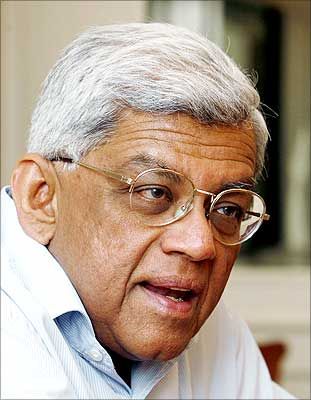 | « Back to article | Print this article |
 As a consensus remains elusive on key economic policies like foreign investment norms, industry leader Deepak Parekh has said India's FDI policy is akin to 'inviting guests over to our house, but not opening the door'.
As a consensus remains elusive on key economic policies like foreign investment norms, industry leader Deepak Parekh has said India's FDI policy is akin to 'inviting guests over to our house, but not opening the door'.
"Look at our Foreign Direct Investment (FDI) policy. Ministers go all out to woo investors, but when investment proposals come, we cannot take decisions. "Our policy on FDI is akin to inviting guests over to our house, but when they arrive, we refuse to open the door," Parekh said during a recent Young Indian Leaders Conclave.
Parekh, Chairman of the country's biggest housing finance company HDFC, has been part of various government panels on key economic issues, as well as a vocal critic of the establishment on various policy matters.
While Parekh did not mention any specific case where any FDI proposal has hit a roadblock, some of the major foreign investments having hit regulatory or other hurdles in the recent past include Jet-Etihad deal.
Besides, a number of foreign companies, governments and overseas industry bodies have been asking India to put in place a mechanism for faster and easier clearance for FDI and other business proposals.
Addressing the Citizens for Accountable Governance Young Indian Leaders Conclave, Parekh also emphasised on the need to urgently weed out the "vested interests" stalling the implementation of various economic reform measures.
"Over 116 legislations are pending for clearance in Parliament. Consensus on any key policy issue continues to remain elusive... Clearly vested interests have to be weeded out," he said.
Parekh said India has "the largest and possibly noisiest democracy in the world. Debate and dissent should be encouraged, but disruption of Parliament is anti-democracy." He also called for looking beyond the economic reforms and paying attention to crucial issues like judicial, electoral, police, land and labour reforms.
At the same time, Parekh said all has not been lost as yet, although it has become very easy to become a "perennial pessimist".
"Yes, the Indian economy is struggling on many grounds, whether it is getting its infrastructure in place, policy uncertainties, corruption scandals, coalition politics and of course, growing uncertainties with the impending general elections in 2014.
"Yes, there are many concerns, but structurally, India is on a far more sounder footing today," he said. Recalling the days of early 1990s, he said the country was on the brink of default and the "only way to tide over the balance of payments crisis was for the country to airlift its gold reserves to pledge it for a loan".
"India's current account deficit has again widened to unsustainable levels, growth has slowed, there is a sense of policy paralysis on many issues and the Indian rupee has depreciated by 11 per cent within a month's time," he said, but added that the country is still on stronger footing today.
"Yes, the Indian economy has slowed down, but so has the rest of the world, including all the emerging markets including other BRICS countries. Even at a 5 per cent GDP growth, India remains among the fastest growing economies.
"The disappointment is that we are performing significantly below our true potential and the reasons for this is mostly our own doing and not because of the global financial crisis," he said.
Sounding a note of caution, Parekh also said "while we look at a promising India, we must also not lose sight of the stark dichotomy that still exists in India.
"While on one hand we see rapid development, we must remain sensitive to the needs of the 'have nots'... In the recent period, we have seen a number of countries where there is rising social unrest... "These examples are warning signals for India to begin to get its house in order," he said.